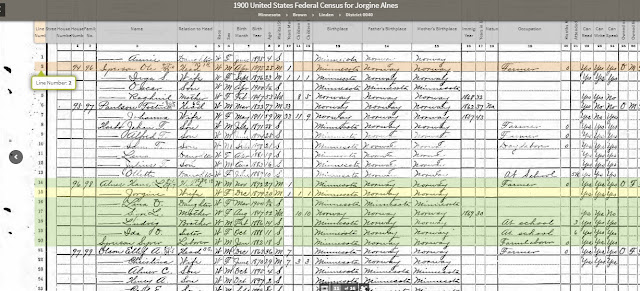Jorgine Syverson Ahlness: A Family Disaster 1879-1908
The word “disaster” usually inspires
visions of floods, tornadoes, fires and plagues of locusts, the type of material
that is perfect fodder for disaster movies. But disasters can be smaller and
more personal in scale—the type of disaster that rocks a family.
Jorgine Syverson was my great-aunt
and sister to my paternal grandmother Regina Syverson Peterson. Jorgine,
sometimes spelled Jergina, was born December 1, 1879 on her parents’ farm in
Linden Township in Brown County, Minnesota. She was Ove and Ragnhild Syverson’s
fourth daughter. She probably had no memory of her father; he died in a farming
accident when she was only two. Jorgine’s mother kept the family together and
managed to keep the farm operating, first on her own, and then with the help of
her two surviving sons, Ole and Sever, and her older daughters.
Jorgine married a neighbor man, Hans
Ahlness. The Ahlness and Syverson families appear on the same census pages in
1880 and 1900, with only one other family listed between them, so I suspected the
farms were quite close to each other.
The 1900 plat map for Brown County shows
my hypothesis was correct; both families had 160 acre homesteads just south of
Linden Lake and west of Emerson Lake (which no longer exists), probably a
quarter of a mile apart at most.
Jorgine
and Hans married December 8, 1898. She had just had her nineteeth birthday days
before. Hans was seven years older. Like Jorgine, Hans had lost his father,
Lars, while he was quite young, leaving Hans to manage the farm and support his
mother and several of his younger siblings. The 1900 census shows Hans,
Jorgine, and their first child Lina Alvida, living with Hans’ mother, Sigri, and
his little brother Ludwig, 14, and sister Ida, 11.
Jorgine and Hans went on to have
four more children over the next eight years. In addition to Lina, born in
1900, they had Oscar, born in 1902, Stina, born in 1904, Richard, born in 1906,
and Harry Joseph, born in 1908.
Unfortunately, Jorgine died December
13, 1908, just eight months after little Harry’s birth. According to her
obituary in the local newspaper, The Hanska Herald, “About three years ago,
[Jorgine] was sick with consumption from which she apparently recovered and for
nearly two years following enjoyed good health, but early last July the disease
returned. Since, she has been ailing more or less from time to time, and during
the three weeks preceding her departure she suffered continuously.”
The obituary was one of the most
flowery, sweet pieces of journalism I’ve ever read. The loss of such a young
woman struck the Herald’s editor hard; he truly eulogized her. Here are some
excerpts:
“Not often has the Herald been
called to perform the duty of recording so sad a death. Wherever the word
passed over the community it left sorrow and expressions of sympathy for the
little motherless children and the bereaved father.
“She was of a conscientious
disposition striving at all times to make her home full of happiness and love
for her family. The comfort and well being of her dear children she always had
at heart. For them she labored from day to day with never ending patience.”
Writing of Jorgine’s burial in the
Linden Lutheran Church cemetery near the Ahlness farm, the Herald stated, “In
this dearest of all places to her, she lies down at length to sleep and rest.
Beautifully appropriate such a resting place, where her kindred sleep and where
a few of her lifelong friends remain to gather about the dear form with honest
tears of bereavement, to lay her away tenderly in the narrow house with its
curtains of fadeless green.”
The Herald’s obituary concludes with
the following passage:
“Gone from our sight! But because
life and love are stronger than death, she is ours still. She is still the
mother of the dear children, upon whom she doted with such clinging fondness,
and the companion still of him who mourns earth’s greatest loss, and may she
not by this very transition wield over them a stronger force for goodness and
truth than before.”
What an amazing tribute to a life cut
down too soon, and a recognition of the devastation her family faced at her
death.
Sadly, Jorgine’s youngest son Harry
died just months after Jorgine, a month shy of his first birthday. It must have
been nearly impossible to care for such a young infant without a mother even if
Hans was able to find a wet nurse. Harry may have also caught tuberculosis from
his mother. He is buried next to Jorgine.
Hans remarried five years later, and
had nine more children with second wife Ida Vee. Jorgine’s oldest four children
all reached adulthood.





No comments:
Post a Comment